As IHSAA ref runs court, gym has no idea he has Stage 4 brain cancer: 'I'm fighting a war'
THORNTOWN, Ind. -- The five-inch scar is there on the right side of Scott's Smith's shaven head. And so are the tiny indentations all over his scalp from the pads and bandages he pulled off 20 minutes before the basketball game he is about to referee.
Smith wears those pads almost all day and night, every day and night -- pads attached to his skull, connected to black and white wires, connected to a device that is trying to zap the cells inside his brain, to stop them from dividing, growing and spreading.
Few know as Smith runs the court inside Western Boone Junior High, officiating an eighth-grade girls basketball game, that the remnants of a lemon-sized, cancerous tumor are lingering in his head.
As he whistles for tip-off, calls fouls and sprints up and down the court, few in the gym would ever be able to tell, except for that scar and those tiny indentations.
Smith has Stage 4 brain cancer.
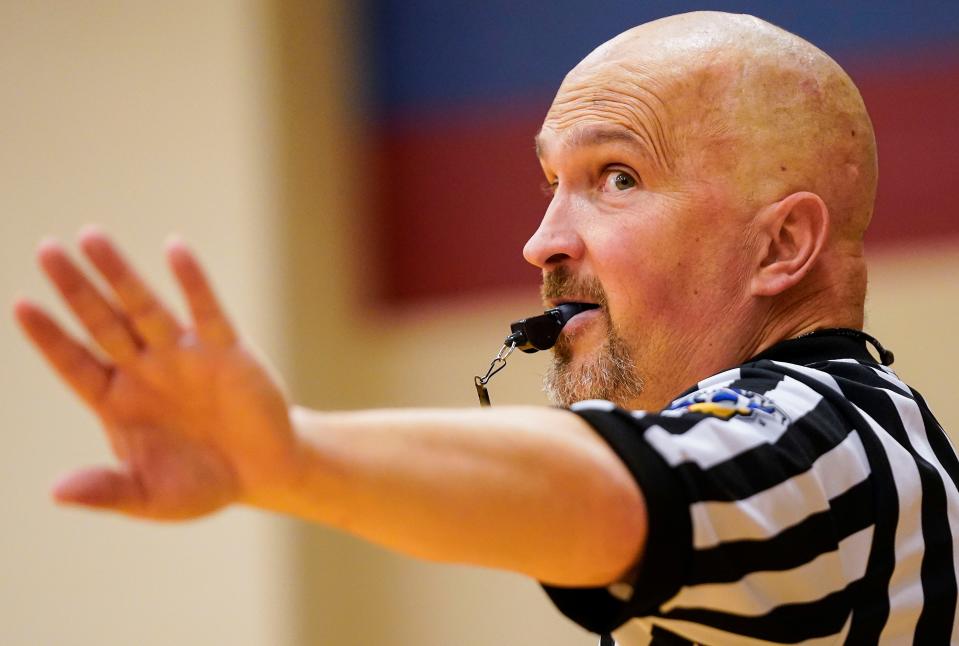
It was two years ago when the cancerous tumor was found, the worst kind, glioblastoma. It is a cancer with an average life expectancy of 12 to 18 months.
Smith is well past 12 to 18 months and well into a number, a prognosis, that no one wants to say out loud. For people with glioblastoma who make it past 18 months, 25% survive two years and only 5% of patients make it more than five years.
"Glioblastoma is a very aggressive form of brain cancer and, currently, there is no cure," according to the Glioblastoma Foundation. "It grows fast and can spread quickly, so by the time it's diagnosed, the chances for survival are low."
Smith has seen the odds and the survival rates and he has read the dire prognoses, his dire prognosis. But he doesn't think about that, at least he tries very hard not to.
"I am so blessed," Smith said, as he sat down to talk to IndyStar before his game at Western Boone last week. He is still wearing the pads on his head and has the scar from a surgery in June 2021 that removed 90% of the brain tumor.
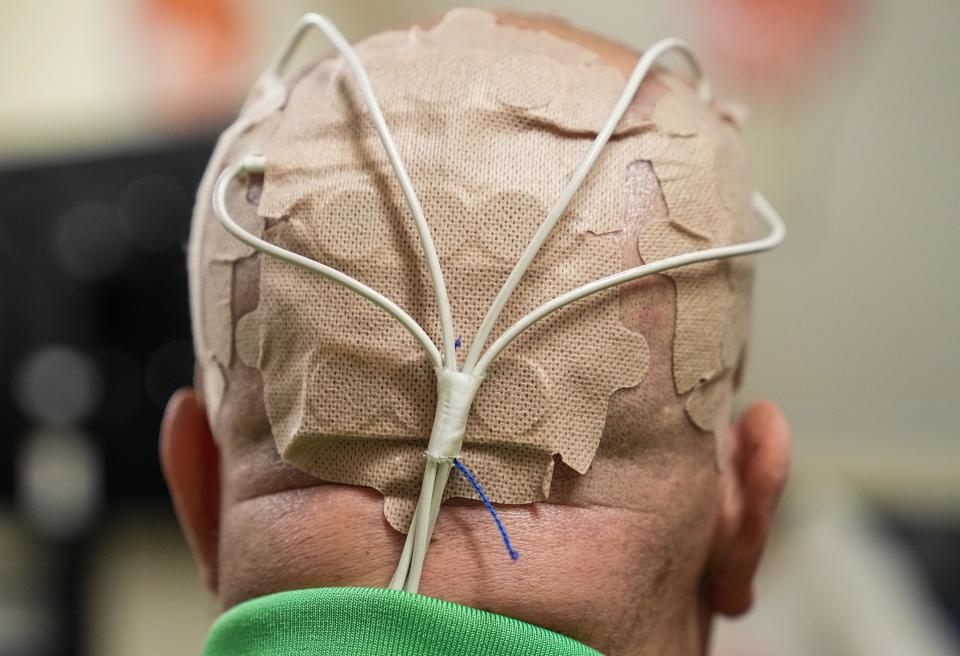
Smith went through radiation and chemotherapy. He started wearing the machine to target the cells of the remaining 10% of the tumor. His most recent scans have come back NED: no evidence of disease.
That is exactly what Smith and his doctors want. The best they can hope for is to stabilize the tumor and hope it lies dormant.
"Surgery alone can never cure this," said Dr. Charles G. Kulwin, Smith's neurosurgeon at Ascension St. Vincent. But Dr. Kulwin and Smith believe staying active, a positive attitude and forging ahead doing the things he loves just might.
And Smith loves one thing more than anything else -- being an IHSAA referee. The past four years, he has officiated baseball, football and basketball. It started as a way to give back to the kids, a way to shape young minds. And now it is a way to show the world that even with Stage 4 cancer, life goes on.
"Scott is a force of nature. He is unstoppable," said Dr. Kulwin. "I think surgery probably slowed him down as little as I've ever seen. There is a big psychological component to all of this.
And Scott said, 'I'm going to beat this thing.'"
'He dropped the bomb on us'
Smith was refereeing a basketball game in December of 2020 when he came into contact with COVID. He didn't know he had COVID; he didn't have any of the respiratory symptoms.
"But what COVID does is it impacts the weakest part of your body," Smith, 50, said. "And in my case, it was a brain tumor." A tumor he had no idea was growing inside his head.
As Smith ran up and down the court, an awful smell would invade his nose, something he describes now as an "out-of-body experience." Doctors later determined Smith was having smell seizures, which are symptoms of a brain tumor.
But when Smith initially went to doctors, they told him he was likely experiencing panic attacks. Smith believed that until Feb. 12, 2021, when he and his wife, Michelle, went on a Valentine's Day date.
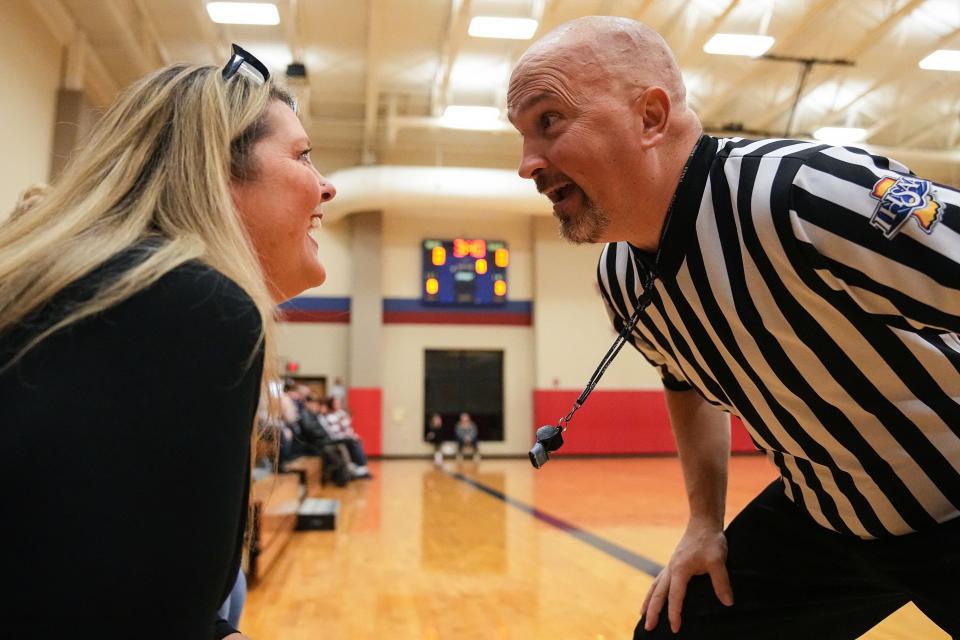
After driving from Crawfordsville, where they live, to Avon to eat at BJ's Restaurant & Brewhouse, Smith pulled into the parking lot.
"And I hit the parking curb like a ton of bricks," Smith said. "And I told Michelle, 'I'm having a big one. Just let me sit here and let me get over it.'"
When they thought his panic attack was over, Smith and Michelle went inside the restaurant to put their name on the waiting list. They headed back to the car with a 45-minute wait in front of them.
Minutes later, Smith turned to Michelle: "Why aren't we going in to eat? I'm hungry." Michelle was dumbfounded.
She started asking Smith questions, like what he had eaten for lunch that day. "And it was just blank," Michelle said. She then asked Smith if he had gone anywhere that day. No, he told her. Michelle knew he had gone to the chiropractor. No, he told her again, he hadn't gone to the chiropractor.
Michelle tried not to panic. She convinced Smith to get into the passenger seat and drove him to the nearest emergency room. After doing a CT scan on Smith, doctors told the couple he needed to be taken immediately to Ascension St. Vincent.
"On that drive, you can't even catch a breath," Michelle said. "At that point, the doctor hadn't really told us what she saw, just that, 'We saw something.' He doesn't know what's going on. I don't know what's going on. You just don't know."
At St. Vincent, the Smiths were given five possible diagnoses and No. 5 on the list was a brain tumor.
"And we kept saying, 'Oh, we're OK because that's the last one on the list,'" Michelle said. "You just kind of hold onto hope it's not really a brain tumor."
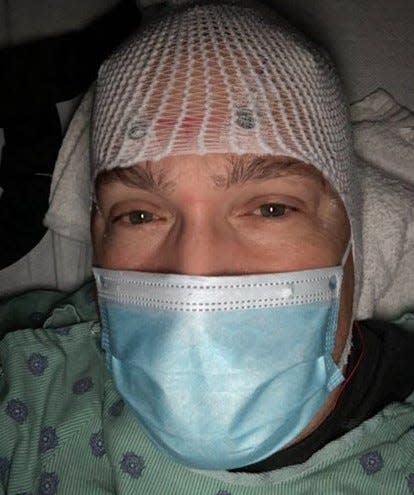
But at a visit weeks later with neurosurgeon Dr. Kulwin at St. Vincent, their hopes vanished.
"He dropped the bomb on us there and said, 'You have a brain tumor,'" said Smith. "I said, 'Say that one more time.' And he said, 'You have a brain tumor.'"
'A black cloud was hanging over my head'
Those five words seemed surreal. How? Why? What did they mean? Smith was 48 at the time and healthy. He was the father of two sons, a man who worked production control at Lakeside Book Company, a youth coach who had led more sports teams the past two decades than anyone could count. And he was an IHSAA official.
As the Smiths drove home after that appointment with Dr. Kulwin, they cried and they wondered what was next. Their entire world, it seemed, had been turned upside down.
But then Smith started thinking, digesting it all and he decided to face brain cancer like a game, like a competition, like he had all his life playing sports, starting with baseball at the age of 4.
"I always said when I played sports, 'If you think positive thoughts, you're going to get positive outcomes,'" Smith said. "So with this, I was like, 'We're going to win the war. We're going to fight the battles and we're going to win the war.'"
Never mind the one year, five years or, if he was really lucky, 10 years he might have left. Smith looked at Dr. Kulwin at one of his appointments and said, "I'm going to do 20 years."
Dr. Kulwin smiled and said, "I hope you can."
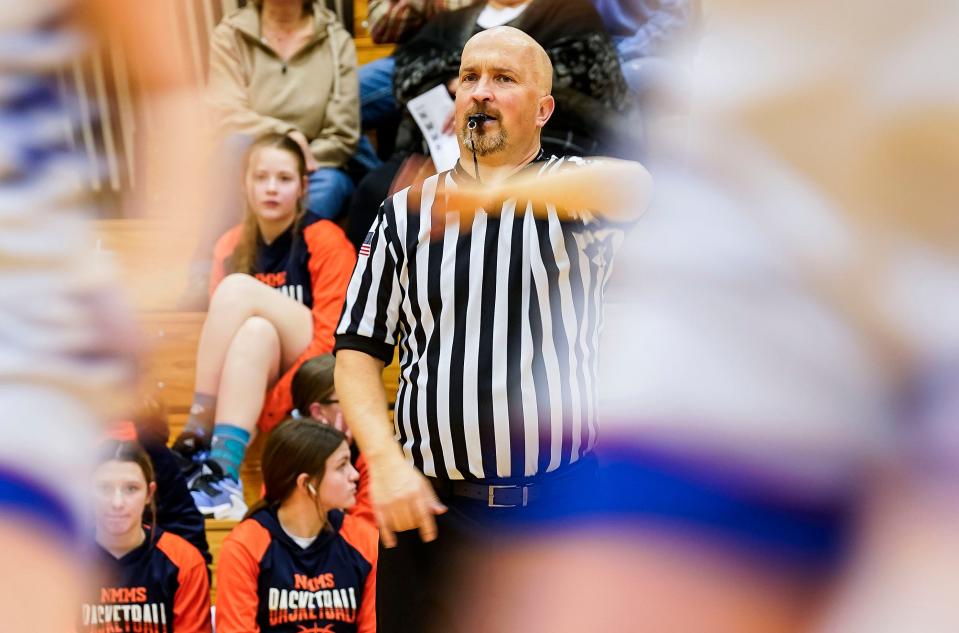
Dr. Kulwin and the entire St. Vincent care team surrounded the Smiths. They were there, Michelle said, at his first radiation appointment as she waited in a room near tears. They were there every step of the way, the nurses, the doctors, the radiologists.
"They are all like family to us and I needed them," Michelle said. "Because, during that time, a black cloud was hanging over my head."
Michelle had been Googling, reading medical papers, searching for cures and nothing she found made her feel any better. Only worse. That average 12 to 18 months life expectancy for people with glioblastoma wouldn't stop invading her search results.
"You're counting those days really quickly and you're thinking, 'OK, this is the last Christmas, this is the last Thanksgiving, this is the last'..." she said. "And it's hard. There is a lot of crying, a lot of praying, a lot of relying on each other."
For months, the family kept Smith's diagnosis a secret. But one night they had a long talk and decided they needed to rely on others, too. At their youngest son Corbin's high school graduation party, Smith made his way around the room to friends and family.
"He just kind of went from one person to the other and said, 'I don't know how to tell you this,'" Michelle said. "'This is not the appropriate time, but I have brain cancer.'"
The Smiths said it was amazing how those friends and family and an entire community rallied around Smith, how they were there at the drop of a hat with anything they needed.
But at the end of each day, when dark settled in, it was just Smith and Michelle, and the thoughts they tried to keep at bay crept in.
"You have this thing called anticipatory grief and that happens instantly. Instantly, I'm already in a panic mode," Michelle said. "Because we've been together almost 30 years and I can't imagine life without him."
'Just bad luck'
They met in biology lab 101 at Ball State University in 1991. Smith and Michelle were freshmen and on the first day of class of their first semester, they were paired up as lab partners.
For the next 20 weeks, they learned the scientific method, tested hypotheses, examined cellular respiration and forged a connection in that lab.
On the next to last day of class, Smith put his arm around Michelle, "because I like to flirt with girls," he said. "I put my arm around her and said, 'You know what? I'm really going to miss you next semester. I'm going to miss seeing your smiling face very day."
On the last day of class, Michelle wrote her phone number down on a piece of paper and laid it on Smith's book. "Here," she said to him, "you don't have to miss me anymore."
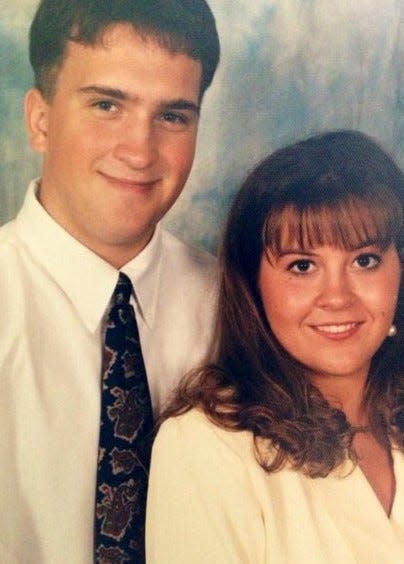
They went on their first date Dec. 7, 1991, at the now-defunct Grisanti's Italian restaurant in Castleton, then to the theater to see "The Addams Family" movie. The movie wasn't so great but the company was.
The two fell in love. Smith proposed to Michelle in July 1994 back at Ball State. They were married in June of 1995 and had two sons, Connor, now 27, and Corbin, 20.
Their boys grew up playing sports, three-sport athletes. And the Smiths were those parents -- Scott, the coach, and Michelle, the team mom.
As Smith was wheeled back for surgery in June 2021, after an MRI revealed that his brain tumor had turned from nonaggressive to aggressive, he was thinking about what an amazing life he had been blessed with. Others were thinking how unlucky he was.
"Gliomas, they are sporadic, not from cell phones, not from smoking," said Dr. Kulwin. "They are just bad luck."
During surgery, Dr. Kulwin was able to remove 90% of the tumor. Smith went home two days later with discharge papers outlining his recovery. At the top of the very first page was the word "exercise."
When the Smiths pulled into the garage, the day he got home from the hospital, they put on their running shoes and went for a walk around the neighborhood, about a half mile.
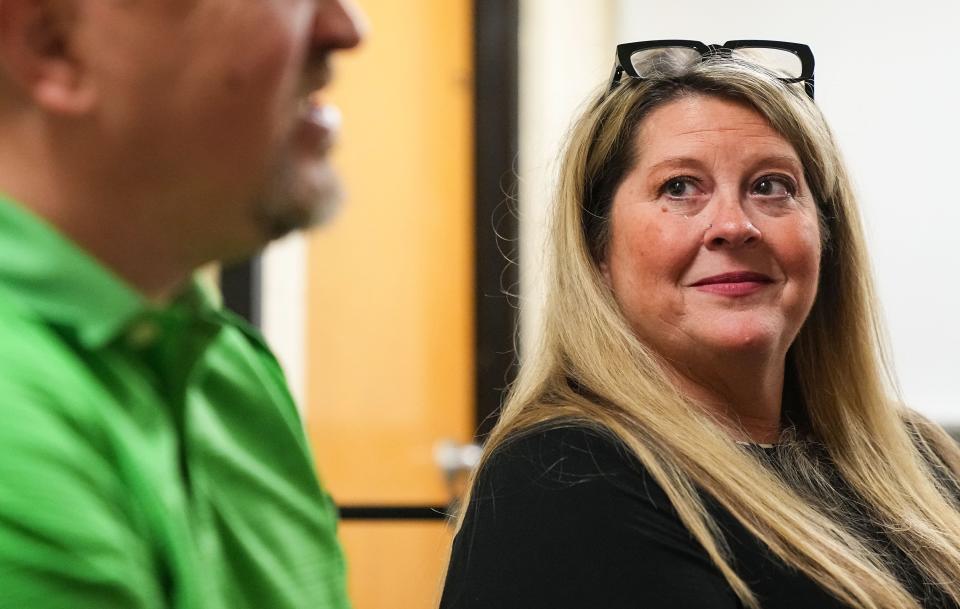
"He wasn't steady on his feet. It took us a long time. It wasn't quick and easy," said Michelle. "But it wasn't about winning the race at that point." At least not the race of walking, but it was about winning the race of life.
Three weeks later, Smith was back to work. And in November 2021, he refereed his first basketball game after surgery, at Crawfordsville High.
Before the game, Smith told the school's athletic director, Bryce Barton, who knew Smith had Stage 4 brain cancer, "If I do something wrong, if I'm out of place, if I'm anything that I shouldn't be, you have to tell me. And I will turn in the rest of my games for the year."
After that game, Barton walked up to Smith, smiling: "I couldn't even tell," Barton told him. "Really, I couldn't tell."
'I don't want to lose my superhero'
Smith has officiated more than 100 games since his surgery 20 months ago. "I want to live life. I want to appreciate things and I want to do things," he said.
At most games, players and fans don't know Smith has Stage 4 brain cancer. At some games, they do. Smith is always more than willing to talk to people about the scar on his head and why he wears those pads on his scalp.
"I want people to see me and know that if you're diagnosed with something, it's OK," he said. "You can still live through it. You can still fight through it."
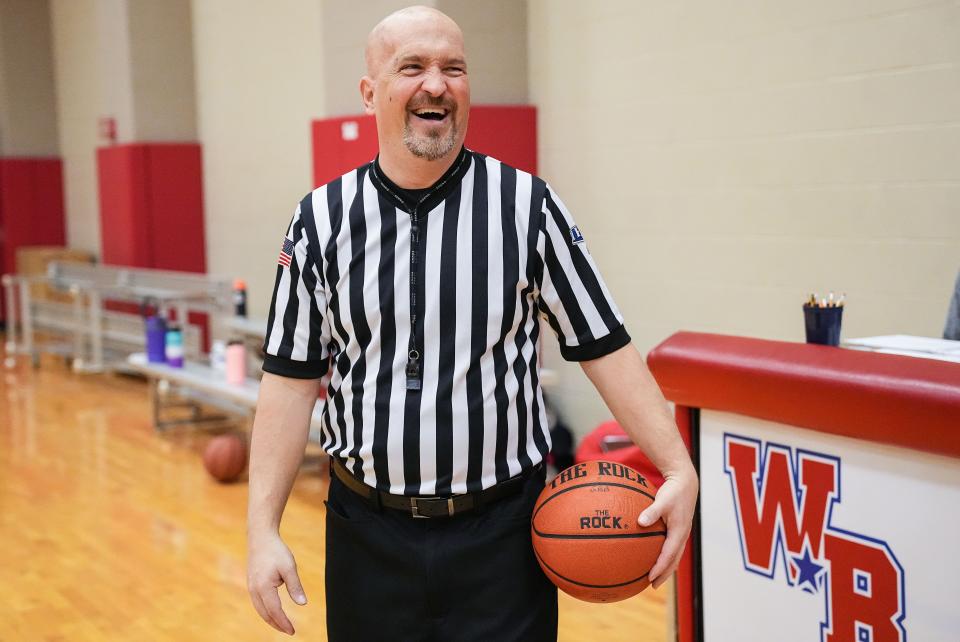
Before Smith took the court to referee at Western Boone last week, he talked about his future, about his hopes and dreams.
"You know what? I appreciate every day a lot more than I used to," he said. "And I want grandkids and I want to live as long as I can with Michelle and drive her crazy. I want to live 20 years because I want to go up to Dr. Kulwin and say, 'See? Told you,' and give him a little fist bump."
For years, the couple had been anticipating the empty nest stage of their lives.
"So we kind of put off a lot of things and said, 'You know, we'll put that on our empty nest bucket list,'" Michelle said. "And so we're enjoying that and we add more to that empty nest bucket list. I don't want to miss out. I want to be able to see what the future has for us. I don't want to lose my superhero."
After Smith's diagnosis, Michelle started taking a lot more photos. And she has saved all his voicemails, hundreds of them, since that day in 2021. She has been Smith's rock -- and he has been hers, too.
"It takes both of us. There are days she's having a bad day and I give her a hug and say, 'We're winning the battles. We haven't won the war yet, but we're winning battles,'" Smith said. "Are we going to lose the war one day? Probably, but we're going to go down swinging."
Ascension St. Vincent earns Indiana's first brain tumor certification
St. Vincent is the first hospital in Indiana and the sixth in the United States to earn The Joint Commission’s Gold Seal of Approval and Certification for brain tumor care.
The hospital went through a rigorous on-site review from The Joint Commission, evaluated for compliance with national care standards, clinical practice guidelines and performance measures.
"It’s very easy to tell people we do a good job. It's easy to run ads and publish things in journals, but The Joint Commission can come, look and confirm that we are doing the work that we think we are," said Dr. Kulwin. "The clinical care has been phenomenal here. The care team for brain tumor patients, I'd stack them up against anybody."
Learn more about St. Vincent's brain tumor care
Follow IndyStar sports reporter Dana Benbow on Twitter: @Dana Benbow. Reach her via e-mail: dbenbow@indystar.com.
This article originally appeared on Indianapolis Star: IHSAA basketball referee officiates games with Stage 4 brain cancer

